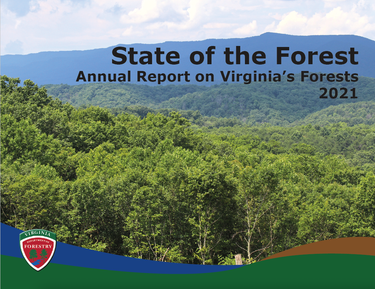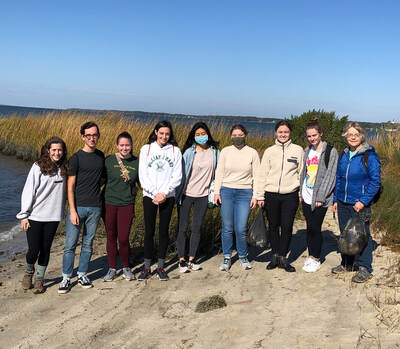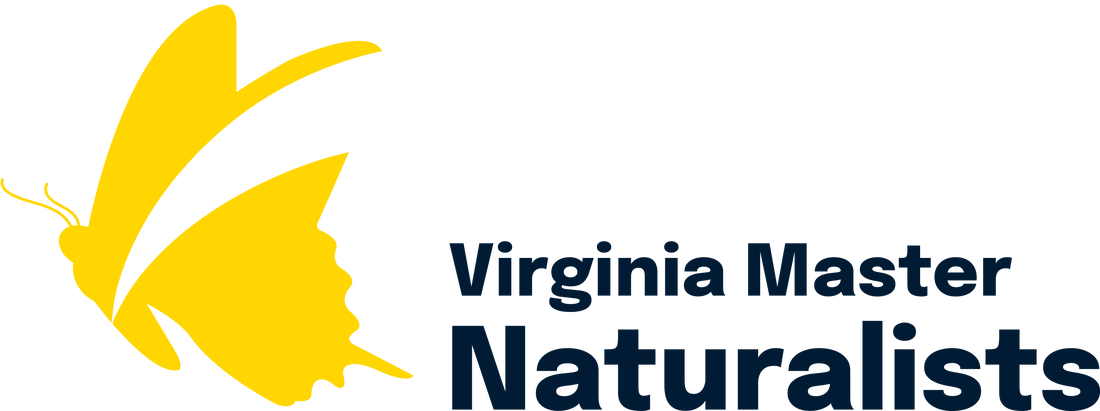
Each quarter, we invite our sponsoring agencies to share news that is relevant to the learning and service of Virginia Master Naturalist volunteers.
New Reports from the Virginia Department of Forestry
Virginia Department of Forestry has two new reports available, summarizing projects, challenges, and accomplishments of 2021.
Learn about the Hardwood Habitat Initiative, Virginia’s newest State Forest, an urban heat island study, and more in the 2021 State of the Forest. We always recommend the current State of the Forest report as background reading for VMN trainees for their Forest Ecology and Management part of the course!
Get the latest updates on insects and diseases impacting our forests in the 2021 Forest Health Review. There is great information here on all those looming forest pests like the Laurel Wilt Disease we talked about in our last issue of this VMN newsletter, and there's even a photo challenge on the last page for you to test your ability to identify them!
New Reports from the Virginia Department of Forestry
Virginia Department of Forestry has two new reports available, summarizing projects, challenges, and accomplishments of 2021.
Learn about the Hardwood Habitat Initiative, Virginia’s newest State Forest, an urban heat island study, and more in the 2021 State of the Forest. We always recommend the current State of the Forest report as background reading for VMN trainees for their Forest Ecology and Management part of the course!
Get the latest updates on insects and diseases impacting our forests in the 2021 Forest Health Review. There is great information here on all those looming forest pests like the Laurel Wilt Disease we talked about in our last issue of this VMN newsletter, and there's even a photo challenge on the last page for you to test your ability to identify them!
Field Training, Events, and Volunteer Opportunities with the VIMS Center for Coastal Resources Management
 William & Mary students enrolled in VMN course during VIMS field trip led by Karen Duhring, Middle Peninsula chapter advisor (far right). Photo by Linda Morse, Historic Rivers VMN.
William & Mary students enrolled in VMN course during VIMS field trip led by Karen Duhring, Middle Peninsula chapter advisor (far right). Photo by Linda Morse, Historic Rivers VMN. VIMS Field Training
Basic training cohorts from three chapters came to VIMS for a coastal ecology field experience in October and November, including the Peninsula, Historic Rivers, and Tidewater chapters. The William & Mary undergraduate COLL of the Wild class, led by Historic Rivers master naturalist and W&M professor Linda Morse, also came to VIMS for field training. Each group conducted a coastal habitat tour on the VIMS campus to experience the Teaching Marsh, a coastal forest, and a York River beach. Each cohort conducted a coastal habitat observation assessment to compare and contrast the defining characteristics, plants and animals, and ecosystem services of four different habitats. Professor Morse reflected “we were incredibly lucky to see dolphins and an eagle snatch a fish” in the York River. Two more Spring 2022 coastal habitat experiences are scheduled for basic training cohorts. Contact Karen Duhring for more information about these field trip experiences.
CrabTrap App Season Now Underway
CCRM is seeking volunteers to help remove derelict crab pots during the annual Crab Trap App project from December 15 – March 16, 2022. According to a recent VIMS study, “ghost” crab pots are the most common type of derelict fishing gear in Chesapeake Bay when they are lost to storms, vandalism, or abandonment and when boat propellers cut the buoy lines. Volunteers are needed to help remove these lost crab pots while the commercial season is closed. Volunteers must be at least 18 years old and must agree to comply with data collection protocols working from their own boats or along the shoreline.
More info and registration here.
2021 Catch the King Tide Results
The 5th annual Catch the King Tide volunteer mapping effort took place November 6-7 to ‘catch’ the highest tide of the year throughout coastal Virginia. More than 100 volunteers collected over 5,000 data marks and more than 150 photographs through the Sea Level Rise app downloaded on smartphones and tablets. This app is currently undergoing some updates with a new version expected to be released in early 2022. Many thanks to all of the mapping volunteers who are helping to validate VIMS hydrodynamic models and raise community awareness about the extent of tidal flooding in Virginia. See the results
Upcoming Events at VIMS
After Hours Lecture Series February 24 Bay Scallops, March 31 Deepwater Horizon
7:00 PM in-person at McHugh Auditorium on the VIMS Gloucester Point Campus and online as a live-streamed webinar. Registration required. More info
May 10 – June 9 Master Oyster Gardeners Course presented by VIMS/VA Sea Grant & Tidewater Oyster Gardeners Association TOGA online via Zoom. This is an in-depth course for oyster gardeners with at least 1-year experience and who want to support the TOGA outreach mission through volunteer service. Applications will be accepted until April 8, 2022. More info
June 4 Marine Science Day The 2022 open house will be held in person at the VIMS Gloucester Point campus and online. This is a free, family-friendly event with something for everyone, including kids’ activities, science talks, seafood cooking demonstrations, lab tours, art and costume contests, exhibits and more. Registration will open February 1. More info
VIMS Speakers Bureau Faculty, staff, and students at VIMS are available to speak to your community organization, school, club, business, or other venue. The topics offered are as diverse as VIMS research. Presentations about VIMS in general are also available for those wishing to learn more about the mission of VIMS and the important work we conduct. To request a speaker, view the Speakers Bureau List and fill out the online request form here. Once we receive your form, we will contact you to schedule your presentation. Requests must be made at least 60 days in advance. Spring 2022 is filling quickly - limited availability remains.
Volunteering at VIMS New volunteers are not being accepted at this time. Open positions will be posted when they become available generally with our outreach and educational programs, only occasionally with specific research programs. Check back for more info.
Basic training cohorts from three chapters came to VIMS for a coastal ecology field experience in October and November, including the Peninsula, Historic Rivers, and Tidewater chapters. The William & Mary undergraduate COLL of the Wild class, led by Historic Rivers master naturalist and W&M professor Linda Morse, also came to VIMS for field training. Each group conducted a coastal habitat tour on the VIMS campus to experience the Teaching Marsh, a coastal forest, and a York River beach. Each cohort conducted a coastal habitat observation assessment to compare and contrast the defining characteristics, plants and animals, and ecosystem services of four different habitats. Professor Morse reflected “we were incredibly lucky to see dolphins and an eagle snatch a fish” in the York River. Two more Spring 2022 coastal habitat experiences are scheduled for basic training cohorts. Contact Karen Duhring for more information about these field trip experiences.
CrabTrap App Season Now Underway
CCRM is seeking volunteers to help remove derelict crab pots during the annual Crab Trap App project from December 15 – March 16, 2022. According to a recent VIMS study, “ghost” crab pots are the most common type of derelict fishing gear in Chesapeake Bay when they are lost to storms, vandalism, or abandonment and when boat propellers cut the buoy lines. Volunteers are needed to help remove these lost crab pots while the commercial season is closed. Volunteers must be at least 18 years old and must agree to comply with data collection protocols working from their own boats or along the shoreline.
More info and registration here.
2021 Catch the King Tide Results
The 5th annual Catch the King Tide volunteer mapping effort took place November 6-7 to ‘catch’ the highest tide of the year throughout coastal Virginia. More than 100 volunteers collected over 5,000 data marks and more than 150 photographs through the Sea Level Rise app downloaded on smartphones and tablets. This app is currently undergoing some updates with a new version expected to be released in early 2022. Many thanks to all of the mapping volunteers who are helping to validate VIMS hydrodynamic models and raise community awareness about the extent of tidal flooding in Virginia. See the results
Upcoming Events at VIMS
After Hours Lecture Series February 24 Bay Scallops, March 31 Deepwater Horizon
7:00 PM in-person at McHugh Auditorium on the VIMS Gloucester Point Campus and online as a live-streamed webinar. Registration required. More info
May 10 – June 9 Master Oyster Gardeners Course presented by VIMS/VA Sea Grant & Tidewater Oyster Gardeners Association TOGA online via Zoom. This is an in-depth course for oyster gardeners with at least 1-year experience and who want to support the TOGA outreach mission through volunteer service. Applications will be accepted until April 8, 2022. More info
June 4 Marine Science Day The 2022 open house will be held in person at the VIMS Gloucester Point campus and online. This is a free, family-friendly event with something for everyone, including kids’ activities, science talks, seafood cooking demonstrations, lab tours, art and costume contests, exhibits and more. Registration will open February 1. More info
VIMS Speakers Bureau Faculty, staff, and students at VIMS are available to speak to your community organization, school, club, business, or other venue. The topics offered are as diverse as VIMS research. Presentations about VIMS in general are also available for those wishing to learn more about the mission of VIMS and the important work we conduct. To request a speaker, view the Speakers Bureau List and fill out the online request form here. Once we receive your form, we will contact you to schedule your presentation. Requests must be made at least 60 days in advance. Spring 2022 is filling quickly - limited availability remains.
Volunteering at VIMS New volunteers are not being accepted at this time. Open positions will be posted when they become available generally with our outreach and educational programs, only occasionally with specific research programs. Check back for more info.


 RSS Feed
RSS Feed